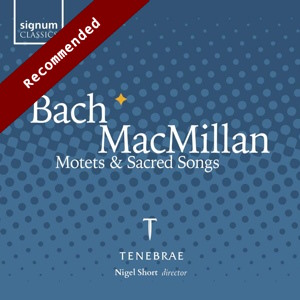
Johann Sebastian Bach (1685-1750)
Komm, Jesu, komm, BWV 229
Sir James MacMillan (b 1959)
Tenebrae Responses (2006): I. Tenebrae facta sunt
Johann Sebastian Bach
Jesu, meine Freude, BWV 227
Sir James MacMillan
Miserere (2009)
Tenebrae Responses: II Tradiderunt me
Tenebrae Responses: III Jesum tradidit impius
I saw Eternity the other night (2021)
Johann Sebastian Bach
Singet dem Herrn, BWV 225
Tenebrae/Nigel Short
rec. live, 27 May 2023, Snape Maltings, UK
Texts and English translations included
Signum Classics SIGCD773 [80]
The first thing that struck me about this disc was its total timing; at over seventy-nine minutes, that is plenty of Bach for your buck – and Macmillan too. Other labels, less value-conscious than Signum, please take note.
Nigel Short tells us in his note in the booklet that he believes James Macmillan ‘….will be revered in 400 years as Bach is today’. That is a huge claim – even Macmillan’s most devoted admirers (and there are many) might be somewhat taken aback. Yet it is, I’m sure, sincerely meant, and coming from a musician such as Short, it really means something. At the very least, it is a signal of his intense commitment to this music.
And the Macmillan performances are, for me, the highlights of this fine disc. The Bach motets, many times recorded as they are, receive carefully prepared, and very stylish performances, even if ‘Komm, Jesu, komm’ is a little stiff and impersonal. This is a brave recording of a live concert, and maybe the singers – one on a part for the Bach – were a little tense at the beginning (that is if ‘Komm’ was the first number at the live event). On the other hand, ‘Jesu, meine Freude’, one of Bach’s greatest vocal works, is superb, with its emotional range fully encompassed.
The Macmillan settings, though, are all simply stunning, and Miserere (track 4) alone would be good enough reason to rush out and buy this CD. The progress through its many changing textures, with plainsong references, and short, telling solos, leads to a final outpouring of glorious vocal tone that just lifts you out of your seat. This is music that only a professional choir can do justice to; the mere business of keeping in tune is massively challenging, but never seems an issue with these talented singers. Maybe there are some discreet ‘patches’ here and there; but I didn’t spot any!
The three Tenebrae Responsories, whose texts tell of the darkest moments in the gospels – the events leading up to the crucifixion – receive performances on this same exalted level. The final line of Jesum tradidit impium contains an unforgettable image; the male voices sing one phrase repeatedly in diminuendo, Latin words that translate as ‘Peter, however, followed Him at a distance, to see the end’. Suspended over this is a single solo soprano note that later flowers into an extraordinary, bird-like refrain. Macmillan conveys both the drama and the devastation of these passages, with wonderfully varied and imaginative choral textures.
That is followed by a setting, premiered by Tenebrae in 2021, of verse by the 17th century Welsh ‘metaphysical’ poet Henry Vaughan, a visionary poem for which Macmillan has found the ideal musical response. Then, after the darkness (‘Tenebrae’ indeed means ‘darkness’) of the preceding numbers, the light-footed joy of Singet dem Herrn acts as a perfect foil. The final ‘Alleluia’, at a comfortable sounding yet breakneck speed, deserves a standing ovation!
This is an outstanding issue, from a choir that has every right to be considered one of the world’s finest choral ensembles of today.
Gwyn Parry-Jones
Help us financially by purchasing from



Previous review: John Quinn (October 2023)


















